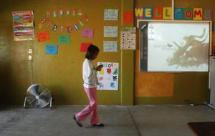
|  |  |  News Around the Republic of Mexico | December 2008 News Around the Republic of Mexico | December 2008  
Mexican State Wants All to Learn English
 Sean Mattson - San Antonio Express-News Sean Mattson - San Antonio Express-News
go to original


| | Edna Mercedes Olivares, 10, walks past decorations in English at her school near Ciudad Victoria in Tamaulipas state, which hopes to become Mexico's first bilingual state. (Sean Mattson/Express-News) |  |
Ejido Manuel Ávila Camacho, Mexico — A few months ago, Edna Mercedes Olivares didn't know a word of English.

Now the 10-year-old leads the mad dash of fifth-graders to her morning English class, stopping at the door and confidently asking her teacher in the new language, “May I come in?”

Kids in small, rural communities such as Olivares' are the latest to join an ambitious English-language program in the border state of Tamaulipas.

By next year, the state wants every public primary school student in the state — all 390,000 of them — taking 40-minute English classes five times a week.

While Tamaulipas' professed goal of becoming Mexico's first bilingual state is far off, the program is considered the broadest in the country.

Teaching English, let alone the standard subjects of math, science and reading, has historically not been a strong point of the Mexican education system — the country was the poorest performer in those areas in 2006 evaluations by the Organization for Economic Cooperation and Development, a group of 30 mostly developed nations.

And Tamaulipas, which borders Texas from Laredo to Brownsville, is near the bottom third in standardized national testing of primary school students.

But this makes its English program, which was started eight years ago but only recently was planned for 100 percent coverage, all the more noteworthy, especially since Mexico's teachers union was sidelined to implement it.

The state directly employs 1,800 English teachers, many of whom are not part of the teachers union, or SNTE, which gives the state greater control over curriculum and teacher accountability.

The teachers union, which often puts politics and cash before education, is regularly blamed for the sorry state of education in Mexico.

President Felipe Calderón's plan to overhaul education had to be brokered with the union, whose flamboyant leader, Elba Esther Gordillo, recently sparked a scandal by saying she would give 50-plus Hummer vehicles to union chapter leaders across the country.

Teacher protests in Oaxaca in 2006 sunk the state into a months-long governing crisis that led to numerous deaths. And there have been strikes this year in Morelos, where teachers have been protesting the education reform plan for months. Critics said they fear reform means they will no longer be able to buy, sell and inherit teaching positions as if they were pieces of property.

In Tamaulipas, keeping the SNTE largely uninvolved in the $10-million-a-year program is “a sensitive issue” said Alicia Zárate, the program director.

Unionized teachers were originally invited to teach English classes but many were ruled out because they lacked qualifications. Union teachers, however, do run some English classes, using an electronic textbook program, in far-off rural areas.

A spokesman at the SNTE office in Ciudad Victoria, the state capital, refused to discuss the issue, saying the union only deals with labor issues.

The English classes appeared to be going well recently in Ejido Manuel Ávila Camacho.

Adrían Rodríguez, 22, began teaching English for the first time this year but seemed perfectly comfortable in front of Olivares' class of about 15. He ran students through an exercise on comparative phrases such as “my dog is taller than my chicken” before an exercise in which the class drew family trees from their grandparents down.

A considerable amount of teacher-student communication was in English. But there are still a few evident kinks in the program, notably with some of the teaching material.

A sign above the whiteboard announced “WELLCOME,” and a poster on the wall translates the months of the year into English — but kept them lower-case, which is how months are written in Spanish.

Rodríguez uses Enciclomedia, an electronic textbook provided by the federal government, as a support tool for classes.

The workstation connects to an off-site server and projects contents on a whiteboard. But the whiteboard was displaying an error message, suggesting there was a problem with the source.

Rodriguez reported problems with the system twice in two months, but a technician still had not come to see what was wrong.

It's not a major impediment to Rodríguez, who has a degree in communication and a certificate as an English teacher.

“I've struggled with them, but they are really smart,” he said of the older age groups, noting that the younger groups pick up the new language faster.

“When I got here, they didn't know any (English), not even ‘what?'” he said, noting that the 69 students in this rancho about 45 minutes outside Ciudad Victoria had not even been exposed to English on television.

Maura Zavala, 37, said she was surprised when her son Rogelio, 8, started coming home and saying funny-sounding words like “sister, brother and teacher.”

“I think it's great that they are learning English,” she said, hoping her son might grow up to be a lawyer. “One hopes the best for them, not like things are here.”

mattson.sean(at)gmail.com |

 |
|  |



